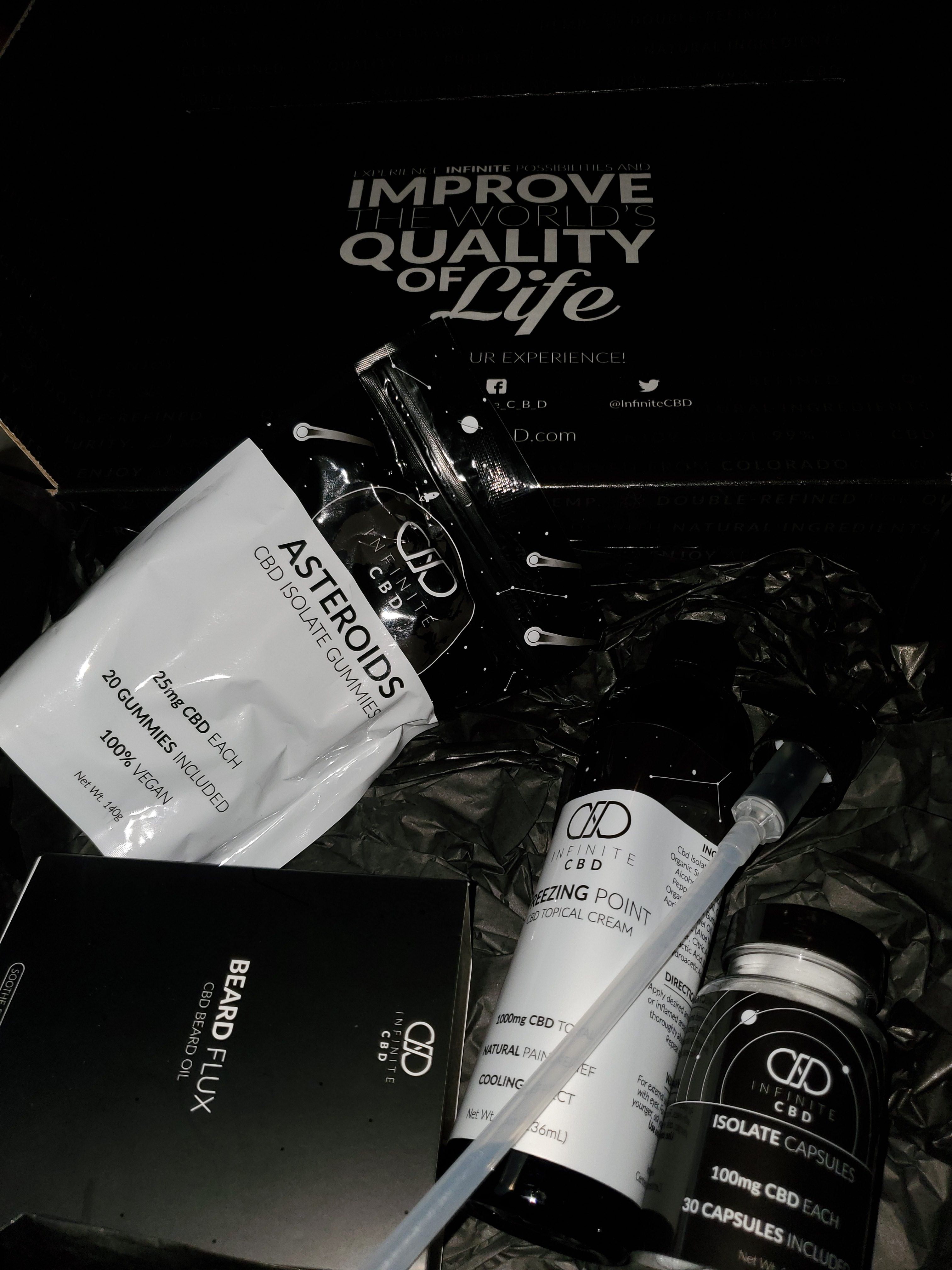Disclosure: In any review for a product or service, products or compensation may have been provided to me to help facilitate my review. All opinions are my own and honest. I am disclosing this in accordance with FTC Guidelines. Please see “Disclose” and "Terms of Use" tabs for more information.

If you are like me, you are willing to try just about anything to stop your chronic pain. Yet for some reason, so many people I talk to are worried about or wholly against trying CBD oils to try to get some relief. Why, I wonder? Maybe they think it’s illegal. Maybe they don’t know what it is. Well, I’d like to give you some insight into my experiences with a particular brand, Infinite CBD. It’s not the only brand I’ve ever tired, but I’m using it right now and here’s my thoughts as well as information about the products and what it is about from the professionals.
What is it, anyway?
“Cannabidiol is a phytocannabinoid discovered in 1940. It is one of some 113 identified cannabinoids in cannabis plants and accounts for up to 40% of the plant’s extract. In 2018, clinical research on cannabidiol included preliminary studies of anxiety, cognition, movement disorders, and pain.
How is cannabidiol different from marijuana?
According to Harvard studies, CBD stands for cannabidiol. It is the second most prevalent of the active ingredients of cannabis (marijuana). While CBD is an essential component of medical marijuana, it is derived directly from the hemp plant, which is a cousin of the marijuana plant. While CBD is a component of marijuana (one of hundreds), by itself it does not cause a “high.” According to a report from the World Health Organization, “In humans, CBD exhibits no effects indicative of any abuse or dependence potential…. To date, there is no evidence of public health related problems associated with the use of pure CBD.”
Is cannabidiol legal?
CBD is readily obtainable in most parts of the United States, though its exact legal status is in flux. All 50 states have laws legalizing CBD with varying degrees of restriction, and while the federal government still considers CBD in the same class as marijuana, it doesn’t habitually enforce against it. In December 2015, the FDA eased the regulatory requirements to allow researchers to conduct CBD trials. Currently, many people obtain CBD online without a medical cannabis license. The government’s position on CBD is confusing, and depends in part on whether the CBD comes from hemp or marijuana. The legality of CBD is expected to change, as there is currently bipartisan consensus in Congress to make the hemp crop legal which would, for all intents and purposes, make CBD difficult to prohibit.
The evidence for cannabidiol health benefits
CBD has been touted for a wide variety of health issues, but the strongest scientific evidence is for its effectiveness in treating some of the cruelest childhood epilepsy syndromes, such as Dravet syndrome and Lennox-Gastaut syndrome (LGS), which typically don’t respond to antiseizure medications. In numerous studies, CBD was able to reduce the number of seizures, and in some cases it was able to stop them altogether. Videos of the effects of CBD on these children and their seizures are readily available on the Internet for viewing, and they are quite striking. Recently the FDA approved the first ever cannabis-derived medicine for these conditions, Epidiolex, which contains CBD.
CBD is commonly used to address anxiety, and for patients who suffer through the misery of insomnia, studies suggest that CBD may help with both falling asleep and staying asleep.
CBD may offer an option for treating different types of chronic pain. A study from the European Journal of Pain showed, using an animal model, CBD applied on the skin could help lower pain and inflammation due to arthritis. Another study demonstrated the mechanism by which CBD inhibits inflammatory and neuropathic pain, two of the most difficult types of chronic pain to treat. More study in humans is needed in this area to substantiate the claims of CBD proponents about pain control.
Is cannabidiol safe?
Side effects of CBD include nausea, fatigue and irritability. CBD can increase the level in your blood of the blood thinner coumadin, and it can raise levels of certain other medications in your blood by the exact same mechanism that grapefruit juice does. A significant safety concern with CBD is that it is primarily marketed and sold as a supplement, not a medication. Currently, the FDA does not regulate the safety and purity of dietary supplements. So you cannot know for sure that the product you buy has active ingredients at the dose listed on the label. In addition, the product may contain other (unknown) elements. We also don’t know the most effective therapeutic dose of CBD for any particular medical condition.
The bottom line on cannabidiol
Some CBD manufacturers have come under government scrutiny for wild, indefensible claims, such that CBD is a cure-all for cancer, which it is not. We need more research but CBD may be prove to be an option for managing anxiety, insomnia, and chronic pain. Without sufficient high-quality evidence in human studies we can’t pinpoint effective doses, and because CBD is currently is mostly available as an unregulated supplement, it’s difficult to know exactly what you are getting. If you decide to try CBD, talk with your doctor — if for no other reason than to make sure it won’t affect other medications you are taking.

What Does CBD Do For Pain?
On the Infinite CBD site, you can read that “CBD, or Cannabidiol, can help alleviate pain by addressing the two mechanisms that make humans feel pain.
First, CBD reduces inflammation. More specifically, research suggests that CBD reduces pain in the joints. Using the CB1 and CB2 receptors located in the immune system, CBD halts the activation of inflammatory T cells. Due to this ability, CBD has been found to help reduce arthritic pain and pain caused by fibrosis.
Additionally, studies have shown that CBD alleviates neuropathic pain by suppressing a3 glycine receptors. Due to this ability, CBD targets not just inflammation, but the pathway that makes humans actually feel it.
Using CBD Lotion for Pain
When applied topically, CBD has the ability to provide individuals with targeted and effective benefits. Using CBD lotion to reduce pain is effective because it can be used on an as-needed basis. No amount of CBD lotion is too much.
You can apply CBD lotion to your skin, which should be rubbed in until absorbed. Wait for about 15 minutes, and viola – relief.
Whether you’re recovering from a sprained ankle, experience chronic back pain, or just got home from surgery, CBD lotion is a natural, effective, and targeted way to address your pain. From the inflammation in the area to the neuropathic pain you’re feeling, CBD is the natural solution you’ve been searching for.
Freezing Point CBD Lotion and Salve
Infinite CBD has created a variety of CBD lotion and salve products that address pain.
Freezing Point Lotion comes in a few varieties. If you’re experiencing severe pain, Nano Freezing Point products are recommended, as CBD nanotechnology make CBD more bioavailable (absorbable) to the body.
Additionally, salve products make applying CBD very easy. Infinite CBD’s salves also include a higher ratio of CBD.
It’s Time to Use CBD Lotion for Pain
Experiencing and managing pain is the worst. Not only does it hurt, but it affects your quality of life and ability to do all of the activities you enjoy.
Use CBD lotion for pain if you’re seeking effective, targeted, and natural relief.”
There are a ton of different ways to take CBD oil. Try out a few different ways and see what best suits you and gives you relief. Its great for pets as well.
















[…] Ever Tried CDB Oil? What’s Stopping You? – Not only does it hurt, but it affects your quality of life and ability to do all of the activities you enjoy. Use CBD lotion. […]